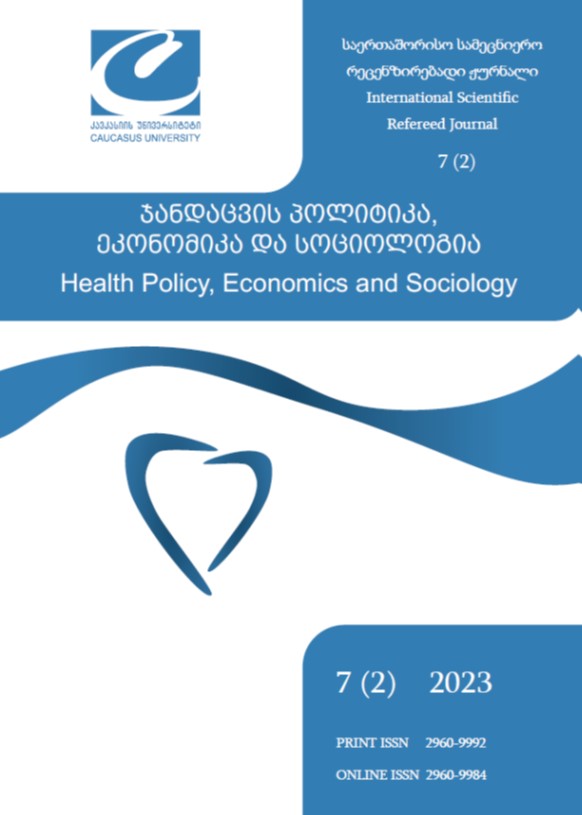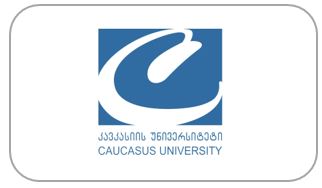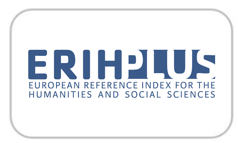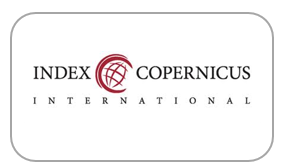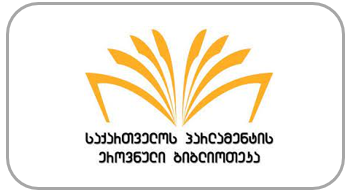რეპროდუქციული ჯანმრთელობის სერვისების მართვა და საკანონმდებლო რეგულირება საქართველოში
DOI:
https://doi.org/10.52340/healthecosoc.2023.07.02.07საკვანძო სიტყვები:
რეგულაცია, კანონმდებლობა, სუროგაცია, დონაცია, ხელოვნური განაყოფიერება, რეპროდუქციული ჯანმრთელობაანოტაცია
შესავალი: რეპროდუქციული ჯანმრთელობის სერვისების, კერძოდ ხელოვნური განაყოფიერების საკანონმდებლო რეგულირებასთან და მართვასთან დაკავშირებული საკითხები ნაკლებად არის შესწავლილი. საქართველოში ძალიან მწირია ამ საკითხთან დაკავშირებული სამეცნიერო კვლევები, რომლებიც საშუალებას მოგვცემდა წარმოგვეჩინა ის უახლესი მიგნებები, რაც სხვადასხვა ქვეყნებში საკონონმდებლო და მმართველობით დონეზე იქნა მიღწეული. კვლევის მიზანია, იმ ძირითადი ფაქტორების შესწავლა და გამოვლენა, რომელიც ხელს უშლის რეპროდუქციული ჯანმრთელობის დაწესებულებების ხელმძღვანელებს სერვისების ეფექტურ მართვაში და მიწოდებაში. კვლევის მეთოდი: კვლევისთვის გამოყენებულ იქნა რაოდენობრივი კვლევის მეთოდები. რესპოდენტებს წარმოადგენდნენ: ხელოვნური განაყოფიერები კლინიკებისა და დონორ სუროგატთა სააგენტოების ხელმძღვანელები. შედეგები: საქართველოში აღინიშნება რეპროდუქციული ჯანმრთელობის სერვისების მონიტორინგის, ბიოლოგიური მასალის ერთიანი ბანკის არსებობის, საკანონმდებლო რეგულაციების სიმწირის პრობლემა, სპეციალისტთა ლიცენზირების და კომპეტენციის საკითხებით გამოწვეული სირთულეები. დასკვნა: რეპროდუქციული ჯანმრთელობის სერვისების და კლინიკების მართვის გაუმჯობესებისთვის, მნიშვნელოვანია გადაიჭრას ისეთი პრობლემები, როგორებიცაა: დონორ-სუროგატთა ასაკის განსაზღვრა, ბიოლოგიური მასალის შენახვის საკითხები, სელექციური აბორტი, სერვისების ხელმისაწვდომობა რაიონებში მცხოვრები მოსახლეობისთვის. აუცილებელია რეპროდუქციული ჯანმრთელობის სერვისების მარეგულირებელი ნორმატიული აქტების გადახედვა, უახლესი კვლევების და უცხოური გადილაინების/პროტოკოლების გათვალისწინებით.
წყაროები
ვერულავა, თ., ხაბეიშვილი, მ. (2015). უშვილობის მკურნალობა საქართველოში - ჯანდაცვის პოლიტიკა და დაზღვევა.
საქართველოს საკანონმდებლო მაცნე. (2016). საქართველოს იუსტიციის მინისტრისა და საქართველოს შინაგან საქმეთა მინისტრის ერთობლივი ბრძანება. მუხლი5, №133–№144. https://matsne.gov.ge/ka/document/view/3245541?publication=0
უკანასკნელად იქნა გადამოწმებული - 23.10.2023.
საქართველოს საკანონმდებლო მაცნე. (2022). საქართველოს კანონი პაციენტის უფლებების შესახებ, კონსოლიდირებული ვერსია. მუხლი 10. https://matsne.gov.ge/ka/document/view/16978?publication=12 უკანასკნელად იქნა გადამოწმებული - 23.10.2023.
საქართველოს საკანონმდებლო მაცნე. (2022). საქართველოს კანონი ჯანრთელობის დაცვის შესახებ. პარლამენტის უწყებანი, 47-48, 31/12/. მუხლი 143. https://matsne.gov.ge/ka/document/view/29980?publication=47 უკანასკნელად იქნა გადამოწმებული - 23.10.2023.
საქართველოს სახალხო დამცველი.(2018). ადამიანის უფლებები სექსუალური და რეპროდუქციული ჯანმრთელობისა და კეთილდღეობის ჭრილში. ქვეყნის უფლებრივი მდგომარეობის შეფასება, თბილისი.
შენგელია, ლ., ჯალაღანია, ლ., დეკანოსიძე, თ. (2018). სექსუალური და რეპროდუქციული ჯანმრთელობა და უფლებები: ეროვნული შეფასება. სახალხო დამცველის აპარატი, გაეროს მოსახლეობის ფონდი საქართველოს ოფისი.
წულეისკირი ნ., ჯობავა მ. (2014). რეპროდუქციული ჯანმრთელობის საკანონმდებლო მიმოხილვა. ასოციაცია ,,ჰერა XXI“.
Westermann S, Steinicke H, Mengel J, Diekmann L. (2019). Reproductive medicine in Germany – towards an updated legal framework. National Academy of Sciences Leopoldina.
Rusanova NE. (2020). Assisted reproductive technologies in Russia: medical breakthroughs and social problems. Institute of Socio-Economic Studies of Population at Russian Academy of Sciences, Moscow.
Farber S, Marks NJ, Mackie V. (2020). IVF and Assisted Reproduction: A Global History by Palgrave.
Verulava T, Pirtskhalava M. Fertility Awareness and Knowledge among Infertile Women in Georgia: A Cross-sectional Study. Int J Infertil Fetal Med 2022;13(2):72–77
ჩამოტვირთვები
გამოქვეყნებული
როგორ უნდა ციტირება
გამოცემა
სექცია
ლიცენზია

ეს ნამუშევარი ლიცენზირებულია Creative Commons Attribution-ShareAlike 4.0 საერთაშორისო ლიცენზიით .
